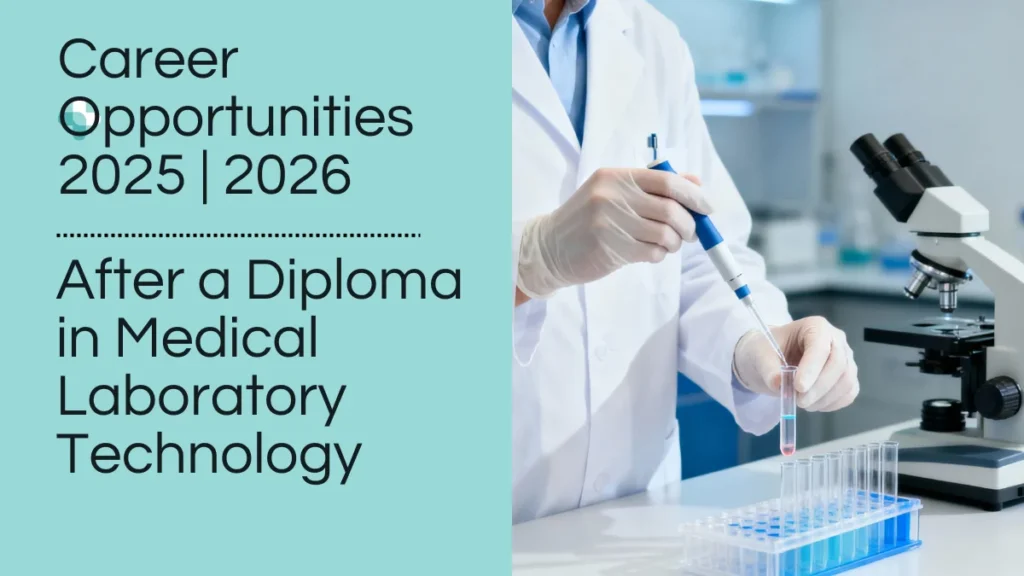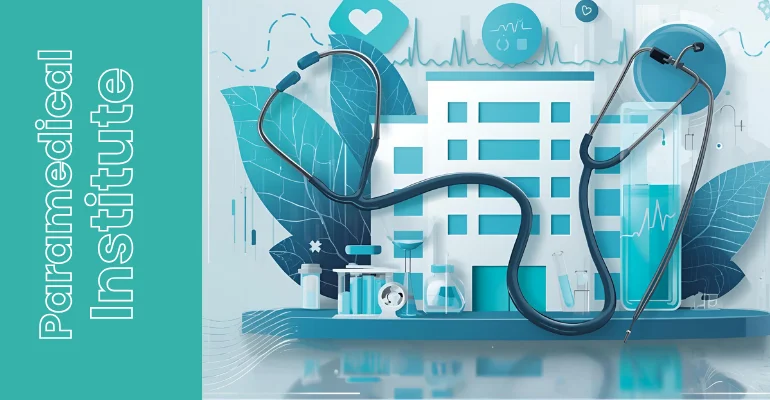
In today’s healthcare ecosystem, skilled laboratory professionals are indispensable. If you are considering a diploma in medical laboratory technology, you’re choosing a pathway into a vital domain of diagnosis and patient care. This diploma equips you with hands-on skills, scientific knowledge and lab experience that enable you to work behind the scenes—yet make a major difference in healthcare outcomes.
Why choose a diploma in medical laboratory technology?
A “diploma in medical laboratory technology” (often abbreviated DMLT) is typically a two-year program that trains you in areas such as clinical biochemistry, haematology, microbiology, anatomy and pathology. (TMU)
You’ll learn how to collect, process and analyse biological specimens (blood, urine, tissues etc), interpret test results and assist doctors in diagnosis and treatment. The demand for such professionals is rising because every hospital, clinic and diagnostic lab needs them. (dpmiindia.com)
If you want a career in the healthcare field but perhaps want a faster route than a full bachelor’s degree, a diploma in medical laboratory technology offers a credible, practical, job-oriented option.
Key skills and eligibility
To enrol for a diploma in medical laboratory technology, you generally need to have completed class 12 with science (Physics, Chemistry, Biology) and meet the minimum marks criteria at the institution. (deshbhagatuniversity.in)
Important skills for success include:
- Attention to detail (lab tests must be accurate)
- Manual dexterity and comfort working with equipment and samples
- Basic knowledge of biology and chemistry
- Ability to follow protocols and safety measures in labs
- Good communication (to interact with doctors, technicians and colleagues)
Having these skills will help you stand out and move ahead in your career.
Promising career roles after a diploma in medical laboratory technology
Once you’ve completed your diploma in medical laboratory technology, a variety of job roles become available. Below are some of the prominent ones:
- Medical Laboratory Technician / Technologist: You will perform diagnostic tests on blood, fluids and tissues, manage sample preparation, operate lab instruments and report findings. (dpmiindia.com)
- Pathology / Clinical Lab Assistant: Here you assist pathologists or senior lab professionals by preparing slides, staining, processing specimens and maintaining lab equipment.
- Microbiology Lab Technician: If you are interested in infections, viruses, bacteria and microscopy work, this is a suitable role. The role involves identification of microorganisms and assisting in diagnosing infectious diseases.
- Blood Bank Technician: In this role you’ll be involved with blood donation processes, screening, cross-matching, storage and making sure blood supplies are safe and ready for transfusion. (ITEES College Of Health Sciences)
- Quality Control / Lab Safety Technician: Ensuring that labs follow standard operating procedures, calibrate instruments, maintain accuracy of test results and comply with regulatory standards.
- Research Assistant in Diagnostic or Pharmaceutical Labs: With experience, you may support research projects, help develop diagnostic tests, or assist in clinical research labs.
- Lab Manager / Supervisor (with experience or additional qualification): Over time, you may move into supervisory roles, managing lab operations, staff, budgeting and quality assurance.
Salary & job market outlook
In India, the job market for graduates of a diploma in medical laboratory technology is steadily growing, thanks to the expansion of diagnostic services, pathology labs and healthcare infrastructure. (Jagannath University)
Starting salaries for fresh diploma holders vary based on city, employer and role. For example, entry-level positions may start from around ₹15,000 to ₹25,000 per month (~₹1.8-3 lakh per annum) in many smaller labs. (George Telegraph)
With 2-5 years of experience and some specialization, salaries can rise to ₹3-5 lakh per annum or more. (ITM)
Also, as you move into senior roles, lab management, or specialise (microbiology, molecular diagnostics etc) the pay can be higher. Thus the ROI (return on investment) for the diploma in medical laboratory technology is good if you are motivated.
Also Read
Physiotherapy Course in Kolkata with Placement Guarantee: Launch Your Healthcare Career
Pathways for advancement
Holding a diploma in medical laboratory technology opens doors, but you can further enhance your career by:
- Pursuing a bachelor’s degree (e.g., BSc in Medical Laboratory Technology) or other allied health science degrees.
- Specialising in advanced techniques: molecular diagnostics, cytogenetics, virology, histopathology etc. (Jagannath University)
- Gaining certification in lab quality management, equipment maintenance, or management.
Gaining experience in reputed hospitals or diagnostic chains to build credentials.
By combining the diploma in medical laboratory technology with further study and experience, you enhance both your career window and salary growth.
Why this career matters
Your work as a lab technician or technologist has real impact: you provide the data and results which doctors rely on to diagnose and treat patients. In many ways you are the backbone of diagnostic medicine. The value of a diploma in medical laboratory technology becomes clear when you realise how many diseases, infections and treatment decisions depend on lab work. Moreover, with the growth of healthcare in India and globally, demand remains high.
Tips for success
- Choose your institute wisely: Look for good lab facilities, hands-on training and placement support when selecting where to do your diploma in medical laboratory technology. (dpmiindia.com)
- Get practical experience: Try to secure internships, volunteer in diagnostic labs and practice using the equipment.
- Stay current: Lab technology evolves (automation, molecular diagnostics, AI in labs) so keep learning.
- Develop soft skills: Communication, teamwork, reliability and organisational skills matter a lot in labs.
- Explore specialisation early: If you have interest in microbiology, molecular biology, histopathology, focus on those areas to stand out.
- Build certification or extra courses: Certificates in blood bank technology, lab quality control or LIS (lab information systems) add value.
Read Also
Paramedical Previous Year Question Paper with Solution 2024 | 2025
Final thoughts
A diploma in medical laboratory technology is a smart, practical, and impactful choice for students who wish to enter the healthcare diagnostics domain without committing to a long degree program. It offers a direct path to employment, diverse job roles, and meaningful contribution to patient care. With dedication, further learning and focus, you can grow from a lab technician to supervisory or specialist roles, all the while contributing to the health and wellness of the community.
If you’re passionate about science, enjoy working in labs and want a rewarding job in healthcare — this diploma might just be the stepping stone you’re looking for.
FAQs
Q1. What is the duration of a diploma in medical laboratory technology?
Typically the diploma in medical laboratory technology is for 2 years (sometimes 1.5 to 2 years depending on institute) and includes both theoretical and practical sessions. (TMU)
Q2. What eligibility is required for admission to a diploma in medical laboratory technology?
Eligibility generally includes completion of 10+2 (Science stream) with Physics, Chemistry and Biology. Minimum marks criteria vary by college/institute. (deshbhagatuniversity.in)
Q3. What jobs can I get after a diploma in medical laboratory technology?
You can work as a medical laboratory technician, pathology lab assistant, blood bank technician, microbiology lab technician, quality control technician or research assistant in diagnostic or pharmaceutical labs.
Q4. What is the starting salary after a diploma in medical laboratory technology?
In India, starting salaries for fresh graduates of a diploma in medical laboratory technology range from about ₹15,000 to ₹25,000 per month in many labs. With experience or in metro cities, this can rise. (George Telegraph)
Q5. Can I pursue higher studies after a diploma in medical laboratory technology?
Yes. After the diploma in medical laboratory technology you can move to a bachelor’s degree such as BSc (MLT), or specialise further via additional certification courses in molecular diagnostics, microbiology etc. This helps advance your career. (Shiksha)
Q6. Is working as a lab technician stressful?
As with any healthcare role, there is responsibility because accurate test results are crucial. You may work shifts, handle biological specimens and ensure lab safety. But for those interested in lab science, it is highly rewarding.





